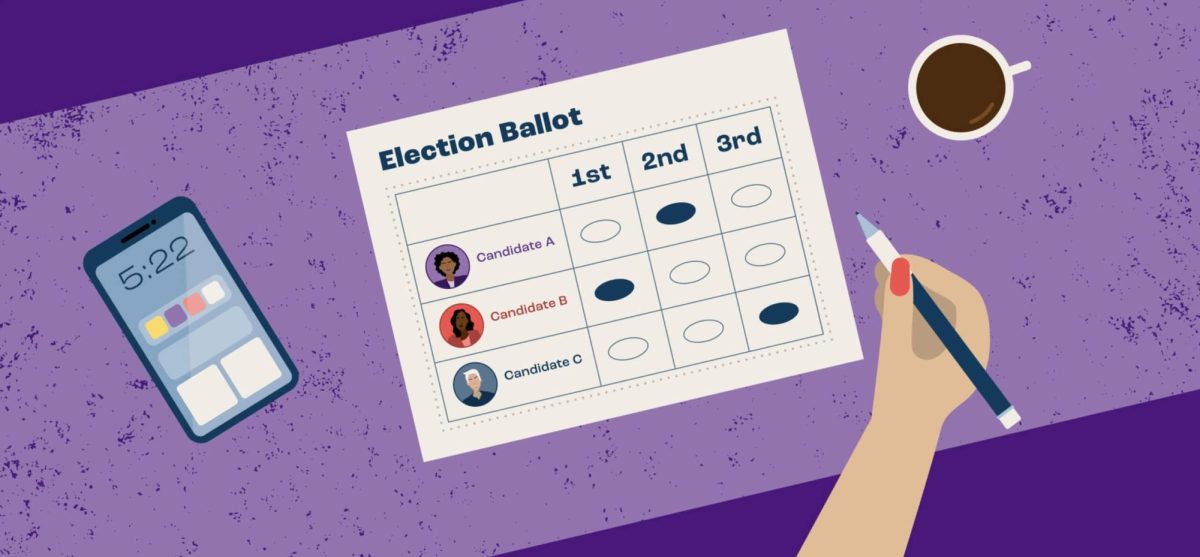After years of political polarization and extremist candidates, Americans have grown tired of our current system of elections. The country’s views of both major parties have continuously worsened over time, with Pew Research Center reporting a record number of disapproving Americans in the past three decades of polling. While experts continue to debate the cause of apathetic voters, the faults of the two-party system should not be overlooked. The United States needs to consider election reform, and rank-choice voting could be the solution.
Although its implementation in the U.S. is relatively new, rank-choice voting (RCV) has been around since the 1850s. Rank-choice voting is an electoral system in which voters rank proposed candidates instead of choosing just one, assigning them first, second, third, fourth, and so on. Then, the candidate who earns the least first place votes is removed from the election, and voters who selected them as first choice will instead have their second pick counted. This process continues until a candidate wins the majority of first-place votes.
The system has already seen success in state elections. Currently, Alaska, Maine, and Hawaii use RCV state-wide and 14 states have incorporated it into their municipal elections. New voters have begun to take notice of this system, urging America to take a note from other democracies.
“More U.S. states should adopt rank choice voting because it ensures that a person elected is approved by the majority of voters,” said senior Orrin Bossert. “Many other countries similar to ours, notably Australia, have adopted this system.”
Rank-choice voting addresses many shared concerns of the American public, such as the dominance of the two major parties. RCV allows voters to advocate their support for third-party candidates without the fear that they would be indirectly helping their least favorite candidate. Instead of feeling like they would be stealing votes from a more popular candidate, their votes will be counted towards their second-choice if their first choice does not win. This change would allow third-parties to overcome barriers and earn the support of new voters.
“The winner-take-all system like in the electoral college makes it very hard for other parties to become relevant, which can be a problem because political ideology is often multi-dimensional,” said senior Keller Yan. “I’d like to see more parties given a chance rather than the constant push and pull between Republicans and Democrats.”
In addition to helping third-party candidates, RCV also incentivizes politicians to appeal to a wider base of voters. Instead of just campaigning to be voters’ first choice, candidates are also rewarded for becoming voters’ second or third choices. If politicians are campaigning to a diverse group of voters, it can help ensure that the whole constituency is being represented. This can help safeguard against extreme political parties causing political polarization.
In response to the rank-choice voting movement in recent years, social studies teacher Mr. Thomas Beaupre taught his students a lesson on rank-choice voting. Although he acknowledges its benefits, he emphasizes that the hardest part about this change would be informing voters.
“The big step is educating people, getting them to understand whether it’s ranked-choice voting or some other system, so that they’ll understand it and be comfortable with it,” said Mr. Beaupre, “because if they don’t understand it, and they’re not comfortable with it, they will not come out and vote. And, we don’t want to introduce that into our elections.”
Despite some U.S. states adopting the new voting system, it has also been outlawed in many states. Critics of rank-choice voting argue that the process is time consuming and costly. Because of the added steps of RCV, it takes longer to acquire the results. Additionally, it would be challenging to switch to an entirely new system across the country, requiring updated voting equipment and training for poll workers.
“It could be difficult to move away from the current system which people are familiar and comfortable with,” said Yan.
Not to mention, some political officials just disagree with the practice fundamentally. They believe that votes should only be counted once, viewing the positives of RCV as a negative.
On the other hand, I believe that the additional time and money spent on transitioning to rank-choice voting would be justified by the benefits this new system could bring. By bolstering third party candidates and encouraging politicians to reach across the aisle on policies, RCV has the power to combat political division and misrepresentation. In my opinion, better cooperation between political parties and voter satisfaction is priceless.
A federal law to legalize rank-choice voting would help clear the stigma from this new system and give states a push in the right direction to implement it into their elections. After it is used at the state-level, it could be integrated into federal elections. I do not doubt that restructuring our electoral system is the fresh start that will breathe new life into American politics.
Ranked-Choice Voting is the Solution to a Hostile Political Climate
Fair Vote
With ranked-choice voting, voters can rank their options instead of selecting just one choice.
About the Contributor

Gianna Cusumano, Co-Editor-in-Chief
Spotlight co-editor-in-chief Gianna Cusumano will graduate this May, leaving behind four years of dedicated involvement to the high school’s student newspaper. Throughout that time, she filled the roles of entertainment and features editor, and this year served as head of the website and social media. In each position, she embraced opportunities to express her passion for advocacy.
“Writing is such a big passion of mine, and giving people information and letting them make their own opinions is really important to me,” she said.
Cusumano first joined the Spotlight out of her general love for writing, which she’s always lived out through writing creative stories. Upon entering high school, she jumped at the chance to join a newspaper writing class in hopes of broadening her skills and finding a community of students with similar interests. Now, she feels that she’s gained all that and more, with fond memories ranging from former editor-in-chief Kishore Annambhotla spilling coffee grains across the publication lab to celebrating the editorial team’s first Best of SNO (School Newspapers Online) award.
“I definitely think the Spotlight has helped me grow as a person and as a writer. The aspect of getting to interview and talk to new people, especially people who have opinions and perspectives different from my own, has definitely made me more confident and outgoing,” Cusumano said. “It’s definitely made me realize I want to pursue journalism further, whether as a career or on my college’s paper.”
Cusumano is excited to pursue news writing further, even after leaving the Spotlight. While she majors in Politics and Public Policy at Lehigh University this coming fall, she will seek out ways to report current events on the side—hopefully through the college’s award winning student newspaper, The Brown and White. This will keep her plenty busy, as her studies are part of a pre-law program on a four-plus-one track, allowing her to earn both her bachelors and masters degrees by 2030.
Gianna is no stranger to hard work, though, as she’s been deeply involved in various activities throughout high school. Her greatest commitment, other than the Spotlight, has been participation in the Southern Lehigh swim team. She’s been part of one swim team or another since age eight, and finished out this year as a team captain. Looking back, she has fond memories from all four years with the group.
“It was really special when I was a freshman. I was swimming in one of our meets and I got a [personal record], and my whole team was beside the lane cheering me on,” she said. “It was really cool to get to celebrate that accomplishment with my team.”
Gianna is also a member of the high school’s National Honor Society and Athletic Leadership Council. Additionally, Cusumano took on the leadership role of co-president of Habitat for Humanity this year, a platform from which she was able to help address housing inequality in the area.
That issue has always been important to her, so much so that she confronted it in an article—one of her favorites among all those she’s written for the Spotlight. She was excited to cover such an impactful topic for her community, as well as explore reporting through different media types as she invited kids to illustrate their concepts of “home.” The piece she wrote was recognized by the National School Press Association’s Fred Ross Systemic Change Journalism Competition, earning it republication in local newspaper, The Morning Call.
“I was really excited to write about current events and inform people on things going on in the world,” she said. “It was really cool to learn more about my community and what was happening around it.”
Now, as she moves on from high school, Cusumano looks forward to a future in public policy, where she can employ skills gained from journalism for her community’s benefit.
“I definitely hope I still have that passion for advocacy, working on things I believe in,” she said. “I also really hope my love for writing stays with me, whether that be with journalism or some other form.”
Tags:


